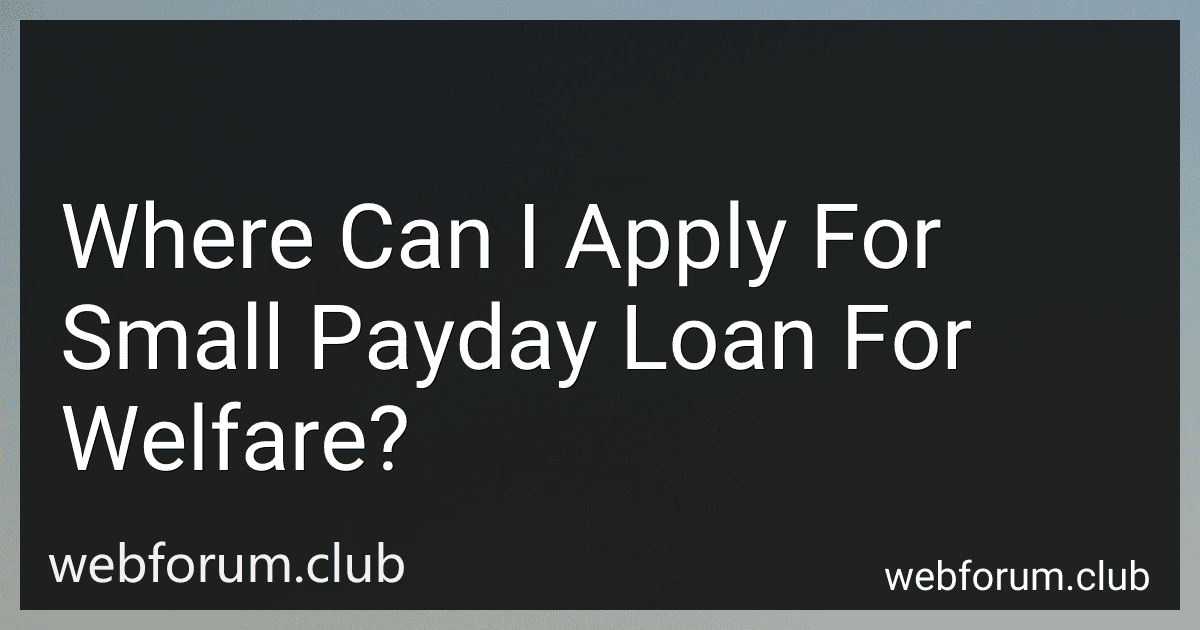If you are on welfare and need a small payday loan, there are a few options available to you. First, you can consider applying for a payday loan through traditional lenders such as banks or credit unions. They may offer payday loan facilities, allowing you to borrow a small amount of money until your next welfare payment.
Another option is to explore online payday loan providers. Many online lenders offer payday loans to individuals on welfare. These lenders typically have a simple application process that can be completed online. You will need to provide some basic personal information and proof of welfare income.
It is important to carefully review the terms and conditions of any payday loan before accepting it. Payday loans often have high interest rates and fees, so it's crucial to understand the total cost of borrowing and ensure that you will be able to repay it on time.
Remember, a payday loan should only be considered as a last resort option and not as a long-term solution to financial difficulties. Before borrowing, it's always advisable to explore other options, such as seeking assistance from local welfare agencies or charitable organizations that provide financial aid to those in need.
Are there any restrictions on how I can use the funds from a small payday loan for welfare?
The rules and regulations regarding the use of funds from a small payday loan for welfare may vary depending on your jurisdiction and the specific terms of the loan agreement. Generally, payday loans are intended to be used for short-term financial emergencies and may not be specifically designed to meet long-term welfare needs. It is important to carefully review the terms and conditions of the loan and discuss any restrictions on use with the lender before borrowing the funds. Additionally, it is advisable to consider alternative options for welfare support that may provide more sustainable assistance.
Where can I find reliable information on reputable lenders offering small payday loans for welfare?
It is essential to exercise caution when seeking a small payday loan, especially if you are on welfare. It is recommended to explore alternatives like assistance programs or low-interest loans offered by non-profit organizations before pursuing a payday loan due to their high-interest rates and potential for predatory lending.
However, if you still wish to find reputable lenders offering small payday loans, you can refer to the following sources:
- Local Credit Unions: Check with credit unions in your area as they often offer small loans with better terms compared to traditional payday lenders.
- Non-Profit Organizations: Contact local non-profit organizations that provide financial counseling or assistance programs for people with low income. They may provide low-interest loans or grants.
- Community Action Agencies: These agencies can provide information and assistance on a range of services for low-income individuals, including financial assistance programs.
- Welfare Offices: Reach out to your state's welfare office or social services department for information on any emergency or short-term financial assistance programs available.
- Government Assistance: Explore if you qualify for any government assistance programs that may provide financial aid in times of need.
- Online Lender Review Websites: Various websites, such as Trustpilot or the Better Business Bureau (BBB), provide customer reviews and ratings for different lenders. This can help you gauge the reputation and reliability of lenders.
Remember to carefully review the terms, fees, and interest rates associated with any loan offer before entering into an agreement.
What are the repayment options for small payday loans for welfare recipients?
Repayment options for small payday loans for welfare recipients may vary depending on the lender and local regulations. However, here are some common repayment options:
- Single Payment: The most typical repayment option for payday loans is a single payment, where the borrower repays the entire loan amount, including fees and interest, in one lump sum on their next payday.
- Installment Payments: Some lenders may offer installment payments, allowing the borrower to repay the loan in multiple smaller payments over a certain period, typically in 2 to 6 months. This option may come with additional fees and interest charges.
- Extended Repayment Plan: In certain situations, a borrower may be eligible for an extended repayment plan. This option allows the borrower to repay the loan in multiple installments over an extended period, relieving the immediate burden of repayment.
- Loan Rollover or Renewal: In cases where the borrower cannot repay the loan on the due date, some lenders may offer the option to extend the loan term by rolling it over or renewing it. However, this can result in additional fees and interest charges.
It's important to note that payday loans generally come with very high interest rates and fees, making it crucial for borrowers to carefully consider their ability to repay the loan and explore other alternatives before opting for this type of loan. Additionally, local regulations and restrictions may affect the available repayment options.
